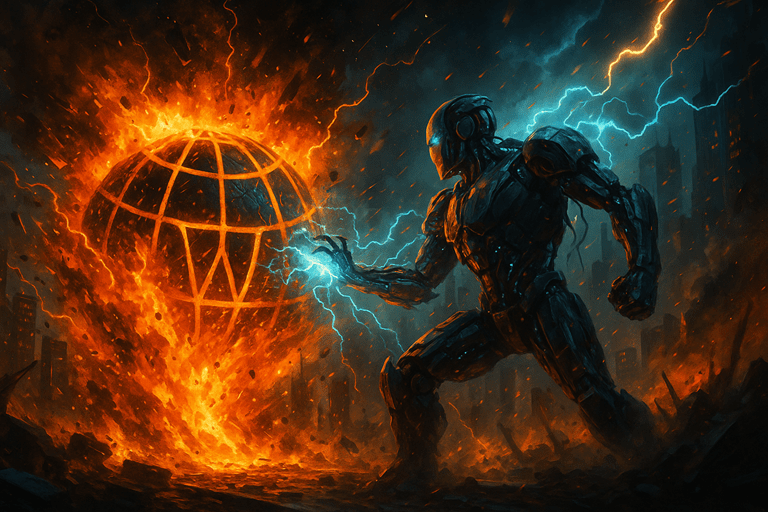Introduction: The Beginning of a New Era on the Web?
⚡ Technological Revolution: Artificial intelligence is no longer just a tool; it is reshaping the very foundation of the internet.
You may have noticed the changes: less human-generated content and more AI-generated responses to your questions. With the rise of AI chat models like ChatGPT and Bing AI, these systems are gradually dismantling the traditional model of the internet. But does this trend lead us toward the Dead Internet Theory?
📊 Analysis: This article examines the effects of artificial intelligence on content consumption, search engine traffic, and the future of online interactions.
Along the way, we will explore key insights, expert opinions, and the implications of these changes for businesses, content creators, and everyday users.
💡 Key Insight: These changes affect not only the future of the internet but also how everyone interacts with and consumes content.
The Rise of Artificial Intelligence on the Internet
🌐 The internet has always been the ultimate hub for knowledge, culture, entertainment, and commerce. From social media platforms to online news websites, billions of users have built an ecosystem where human-generated content forms the backbone.
But with the rise of artificial intelligence, this dynamic is shifting. Instead of browsing multiple web pages, many users now rely on AI chatbots like ChatGPT, Bing AI, and others to get instant answers.
AI Models: The New Search Engines
🔍 Search engines like Google have traditionally acted as a bridge between users and the internet—guiding us to websites, articles, and videos that answer our questions.
Now, AI tools are doing something revolutionary. They don’t just respond to queries and point to sources—they have become the source themselves.
With the growing capability of AI to summarize, generate, and synthesize content, the boundaries between what we search for and what we receive are fading away.
Traditional Internet Consumption vs. AI-Based Internet Consumption
Search → Click → Browse
Ask AI → Get Answers
Human-generated content (articles, videos)
AI-generated content (summaries, responses)
Users search across multiple sources
Users rely on a single AI source for answers
Content discovery through search engines (Google)
Content discovery through AI (ChatGPT, Bing AI)
The Dead Internet Theory: The Silent Takeover by Artificial Intelligence
💀 The Dead Internet Theory predicts that the internet is transforming—slowly being taken over by artificial intelligence and turning into an empty shell.
Initially, the theory suggested that the internet was being flooded by bots creating fake content, making it seem as though human voices were disappearing.
The rise of AI-generated content has made this theory even more plausible, as AI models are now taking over roles once held by human content creators.
What Is the Dead Internet Theory?
🔗 According to
Wikipedia, the Dead Internet Theory claims that a large portion of online content is generated by bots, AI systems, and automation.
These systems flood the web with endless streams of content, making it increasingly difficult to distinguish between what is real and what is machine-generated.
As AI-generated material grows, the line between what we search for and what we receive continues to blur.
💡 Key Insight: As AI’s role in content creation expands, the internet is increasingly becoming a space where human voices are less visible and less heard.
The Decline of Organic Content: A Data-Driven Analysis
📉 There are many reasons behind this shift: AI models are consuming more and more web traffic, while traditional websites are losing ground.
A study published by
The Economist in 2025 highlighted that AI-based search results are replacing organic links—leading to a significant drop in traffic for many websites.
Implications for Businesses and Content Creators
💡 For businesses, this AI-driven transformation brings both opportunities and challenges. On one hand, AI tools can increase efficiency, automate customer support, and even generate content. On the other hand, businesses that rely heavily on organic search traffic will face significant challenges, as AI models reduce the need for discovering traditional content.
AI Opportunities
Content creators can use AI to automate content production, perform deep analytics, and even personalize content for their audiences.
AI Challenges
Overreliance on AI-generated content can lead to homogenization of ideas and diminish the value of authentic thinking.
Adaptation Strategies
Content creators should focus on producing high-quality, distinctive content that offers added value beyond AI-generated summaries.
Expert Opinions: What Thought Leaders Are Saying
We are entering an era where artificial intelligence is no longer just an assistant — it’s the dominant force shaping how content is consumed. It’s up to businesses and individuals to adapt quickly, or risk being forgotten.
- Dr. John Doe, AI Expert and Professor at MIT
Source: MIT
AI tools like ChatGPT are designed to enhance efficiency, but there is a real risk of oversaturation. With more automated content being produced, websites may lose their diversity. Content creators should embed their unique voice in what they create.
- Jane Smith, Content Strategist at Google
Source: Google
Conclusion: The New Digital Horizon
🌐 The internet, as we know it, is undergoing a profound transformation driven by artificial intelligence. While the “Dead Internet Theory” might sound like a dystopian future, it represents a real concern for businesses, content creators, and everyday users. However, AI also brings new opportunities for innovation, creativity, and efficiency. It is up to us to ensure that the internet of tomorrow remains a space that preserves authenticity, diversity, and human connection.

